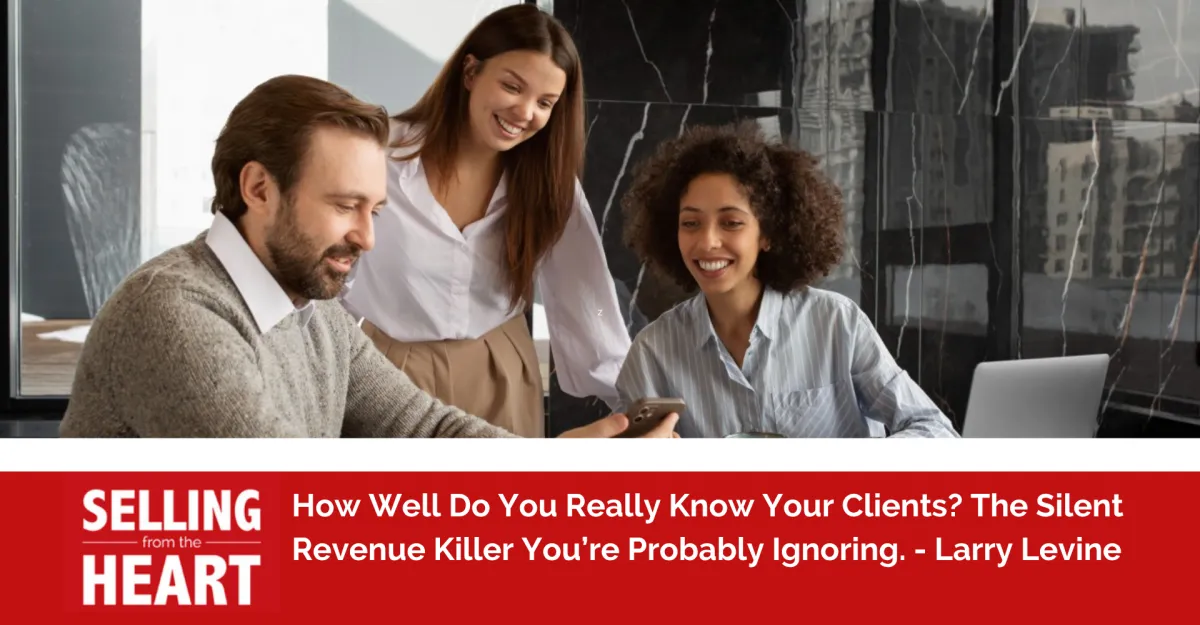BLOG

How Well Do You Really Know Your Clients? The Silent Revenue Killer You’re Probably Ignoring.
"Sometimes you have to get to know someone really well to realize you're really strangers."
Mary Tyler Moore
How often do salespeople and their leaders lull themselves into a false sense of security believing they know their clients? Surface-level relationships can create a false sense of connection.
You might know their business challenges or initiatives, but do you really know them?
Surface level relationships do not equate to a real relationship.
How many have misread their client relationships? Why am I saying this? Because what many thought was a relationship was just transactional familiarity. You and your clients were strangers all along, just strangers with polite smiles and shared agendas.
Getting to know clients isn’t just about accumulating facts about them, it’s about understanding their why. Their fears, their motivations, how they really make decisions.
Without this kind of depth, you’re building your sales strategy on assumptions and thin ice.
Allow the above-mentioned quote to be your wake-up call, to pause and reflect. Who inside your client base do you think you know, but haven’t truly listened to or connected with them on a deeper level?
Where are you mistaking access for intimacy?
True sales professionals just don’t just know their client's business, they understand the people behind it. When you move from transactional to transformational, when your client says, You really get me, you’re no longer strangers. You’re now a trusted partner.
Let’s all be honest, open and transparent, how well do you really know your clients?
You say you care about your clients. You believe you serve them well. But let's pause, I mean seriously pause and ask yourself this... How well do I really know my clients?
Can you answer that without hesitation… or are you defaulting to surface-level familiarity?
In Selling in a Post-Trust World, I dove deep into how many sales professionals and leaders confuse transactions for relationships. They equate casual conversation with connection.
In doing so, they sacrifice the very thing that builds consistent revenue, deep trust.
Relational depth drives revenue growth.
You don’t build that depth through a CRM field or a quarterly check-in. You build it by being genuinely curious, courageously vulnerable, and consistently present.
The secret to long-term sales success is showing up as your true self, every single time.
Deeply reflect and ask yourself:
Do I know what truly matters to my client personally and professionally?
Have I mapped out the decision-making ecosystem inside their company?
Am I bringing meaningful value to every interaction, not just product knowledge, but insights that really shift their thinking?
If not, you’re not alone. Our time together, will be your call to action.
The Delusion of Knowing Your Clients
We’ve been sold a lie. A dangerous myth. That knowledge equals connection.
In pursuit of performance, many have confused proximity with intimacy. CRMs, dashboards, and behavioral analytics have given the illusion of closeness, but closeness isn’t connection.
You don’t know your clients because you know their title, territory, or transaction history.
You know your clients when:
You’ve earned the right to hear their silence.
You’ve asked them what they’re afraid to tell their boss.
You’ve seen the weight they carry, and offered them more than a solution, you offered understanding.
They openly share the fears they won’t admit to anyone else.
The unspoken pressures and personal goals that drive every decision they make.
Their internal scoreboard as to what success really means to them, not just professionally, but personally.
The values they quietly hold, the ones they want reflected in every business relationship.
This is the heart of selling in a post-trust world.
When trust is bankrupt, the most valuable currency is humanity.
What if we stopped measuring relationships by deals closed and started measuring them by truths shared?
Real sales transformation begins when we trade scripts for sincerity, and questions for curiosity. It begins when we see our clients not as so-called targets but as people with dreams, doubts, wounds, and worth.
The metrics may tell us what a client does, but only conversations from the heart tell us why they do it.
I ask you to pause. Breathe. Ask yourself:
Do I truly know what matters most to the people I serve?
Have I earned the right to speak into their aspirations?
Would they describe me as a trusted advisor or just another sales rep?
When it's all said and done, it won’t be your product knowledge or clever pitch that sets you apart. It will be your presence. Your integrity. Your empathy.
Knowing your client, starts with being known as real, reliable, and relatable.
That’s what builds trust. That’s what builds loyalty. That’s what Selling from the Heart is all about.
Friction Hides in the Gaps
Relational neglect breeds operational inefficiency and revenue risk.
You know the deals that get ghosted, the awkward renewals, the prospects that go cold.
That’s friction. And that's your warning light. Here’s the kicker, it didn’t start there. It started in a gap, a small disconnect between you and your client that widened over time.
The gaps are usually:
Lack of high, wide and deep relationships inside the account (you're relying on just one or two people).
Weak understanding of the client’s evolving business needs.
Inconsistent or transactional follow-ups instead of meaningful engagement.
Misalignment between the value you think you provide and the value they experience.
With Friction, Follow-Ups Go Ignored
This often means:
You’re not seen as adding meaningful value, you’re just checking in.
You haven’t built inspirational experiences that make people want to stay connected.
Trust wasn't established early.
With Friction, Additional Selling Opportunities Dry Up
This often means:
You’re seen as just a vendor, not a strategic asset.
You haven’t engaged multiple decision makers or influencers or aligned with their business goals.
You’re not conducting Quarterly Strategic Vision Meetings, to uncover new areas for growth.
Have you stopped being seen as essential? Would you even know?
When you don’t know your clients deeply, you become optional and optional gets replaced.
The Trust Formula, Your Blueprint for Relational Depth
This isn’t theory. This is your relational operating system. When applied with intentionality, it unlocks:
Higher win rates
Deeper client loyalty
Shorter sales cycles
More referrals
Better renewal and expansion conversations
Let’s break down each component of the Trust Formula:
1. Authentic Relationships
Do you really know them, or do you just know them?
When relations are weak, you rely on surface-level rapport. You’re friendly, but replaceable.
When it's strong, you know their goals, frustrations, even their internal politics. You’re a real partner in their business.
2. Meaningful Value
Do you understand what success means to them in their world?
When relations are weak, you sell features. You talk at them. You push what you’ve got.
When it's strong, you speak their language. You tie solutions to their KPIs, not your pitch deck.
3. Inspirational Experience
Are your interactions memorable or forgettable?
When relations are weak, you sound like everyone else. Calls blur together. No emotional stickiness.
When it's strong, your presence lingers. They look forward to your insights. You elevate their thinking.
4. Disciplined Habits
Are you showing up consistently or only when it’s quota time?
When relations are weak, you’re reactive. Unreliable. Missing in action post-sale.
When it's strong, you’re proactive. Reliable. Predictably present, even when there's nothing to sell.

Subscribe to the Selling from the Heart Weekly Sales Digest, click on the image above.
Your Action Steps to Bridging the Relational Gaps
Build Relational Maps
I want you to think of your top 5 clients.
Now ask yourself:
Who do I really know inside the account?
Who’s missing from the business table? (Think influencers, gatekeepers, end-users)
What do I know about them professionally? Personally?
When did I last speak with them?
Create a relational map. Write down names, titles, key priorities, personal interests, and communication styles. This becomes your GPS for deepening connection.
If your map looks like a stick figure instead of a web, you’ve got work to do.
Ask Brave, Heartfelt Questions
Relational depth doesn’t come from surface-level small talk. It comes from courageous curiosity.
Here are a few questions to spark genuine connection:
What’s a win that would make this quarter a home run for you?
When you think about the future of your team, what excites you the most?
What’s one thing I could do better to support your goals?
These questions move the conversation from transactional to transformational.
The depth of your client relationships determines the durability of your revenue.
Show Up Uninvited, But with Value
If the only time you reach out is when a deal is on the line, you’re a vendor, not a business asset.
I encourage to star changing that by:
Sharing an article related to their industry.
Celebrating a personal or company milestone.
Inviting them to an event (even if they say no).
Recommending a podcast or book you think they’d enjoy.
Show them you’re thinking about them, not just selling to them.
Consistency is the trust-builder. Surprise is the trust-multiplier.
Tune into Emotional Signals
In a world full of digital noise, attention is currency.
Become keenly aware of:
A change in tone
A pause before an answer
A post they made about a personal milestone
Zero in on this and then follow up. Send a note. Make the call. Mention it next time you meet.
This isn’t manipulation, it’s humanity. It's being real. It's called, giving a rip.
Use Your CRM as a Relationship Tool, Not Just a Reporting Tool
Most salespeople treat their CRM like a graveyard of stale data.
Flip the script and start using your CRM to log:
Personal details they’ve shared (kids, hobbies, birthdays)
Key phrases they use often (this reveals what matters to them)
Their preferred communication cadence and channel
Think of your CRM as your relationship memory. Use it wisely, and you’ll never show up unprepared.
Trust isn’t a feeling. It’s the result of a framework lived out daily.
The Cost of Not Knowing, It’s Killing Your Pipeline and You Don’t Even See It
You’re good. You’ve got experience. You care about your clients.
But here’s the stone-cold truth:
If you don’t deeply know your clients, you’re already losing.
By this I mean, not on paper. Not in the CRM. In reality, behind closed doors. In conversations you’re not invited to.
You start losing deals you should have won. Why? Because you didn’t connect the dots. You missed the internal politics. You failed to tie your value to what matters to them.
So, when push came to shove, they went with someone else, a professional who took the time to understand.
Bad things happen when salespeople leave the clients business door open.
How many in sales have left the door open? Shall I say, quite a few. You didn’t deepen the relationship. You didn’t build relational strength. You coasted.
So, a sales professional came in, listened better, cared more, showed up when you didn’t and now, they’re running your account.
In a post-trust world, being forgettable is fatal.
The Secret of the Top 1% of Sales Professionals
It’s not slick talk. It’s not charm. It’s not some closing trick.
It’s Relational Equity.
Here's what the top 1% do better:
They know the birthdays and kids’ names and they mean it.
They track company wins and leadership changes, before the competition notices.
They hear what’s not being said, needs, fears, shifts in tone.
They show up when there’s nothing to sell.
They think like insiders, not outsiders.
Most sales reps follow up. The top 1% are invited back. Most pitch solutions. They anticipate problems. Most get ghosted. They get referrals.
Relational equity is your edge. If you’re not building it, you’re just another vendor.
It's up to you; do you want to stay top of mind instead of being left behind?
Wrapping This Up, It's About the Deep Work
It’s easy to send another follow-up. It's harder to build real connection.
It’s easy to recycle a pitch deck. It's harder to walk in with insight that proves you understand.
It’s easy to talk. It's harder to listen for what’s not being said.
This is the work. The quiet, unseen effort that builds trust. That earns you a seat at the table. That makes you unforgettable.
It’s the difference between being just another sales rep and becoming the business asset they never want to lose.
I will leave you all with one final question... If one of your clients was asked how well you know them… what would they say?
Originally published on Larry Levine's LinkedIn.


